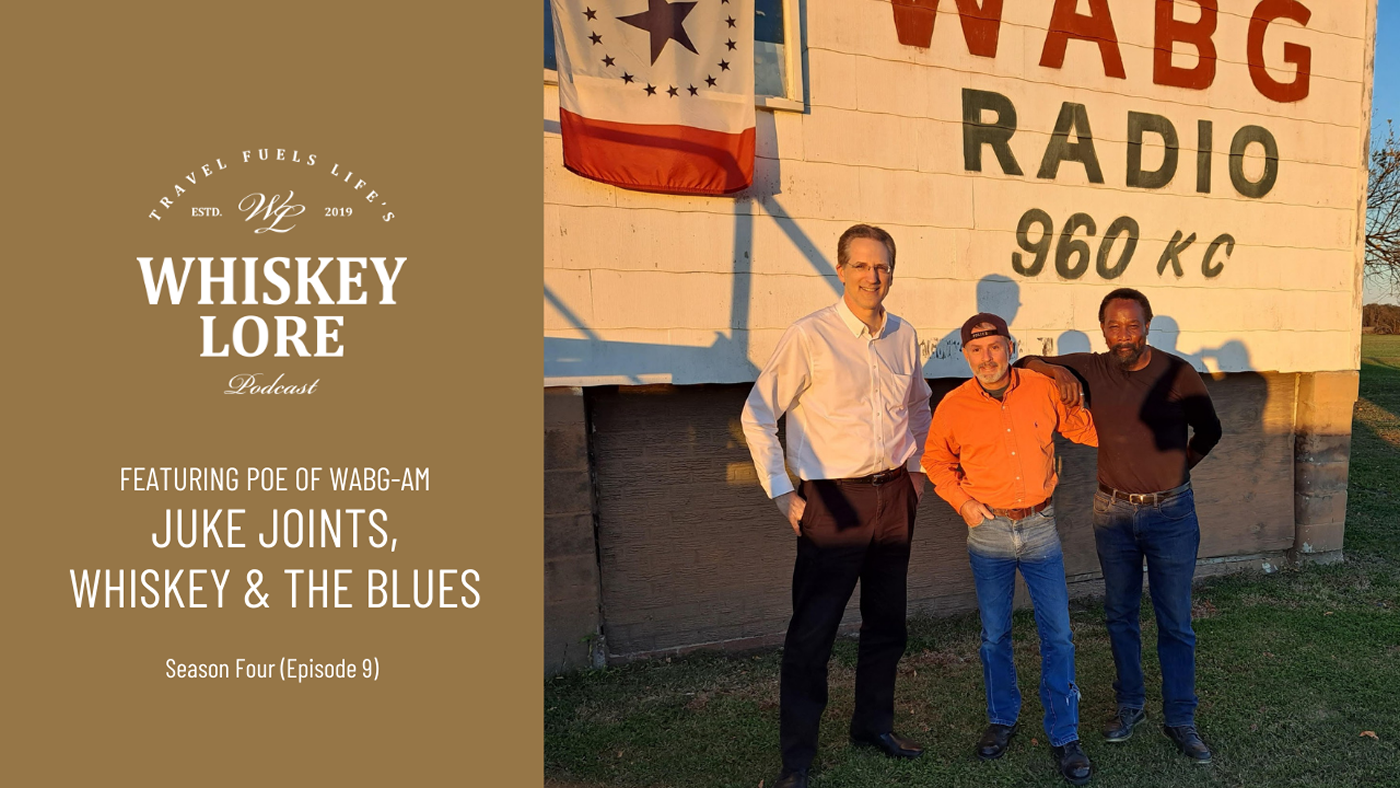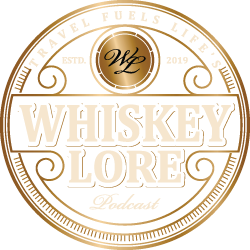Juke Joints, Whiskey, and the Blues (Featuring Poe of WABG-AM)

Hunting for the mythical Crossroads and bumping to the man in the know about Juke Joints.
Listen to the Episode
Show Notes
Continuing my journey through the Mississippi Delta, I made a couple of stops including Rosedale, mentioned in Robert Johnson's Traveling Riverside Blues, and Dockery's Plantation.
My final stop was to be the final resting spot of Robert Johnson, but a surprise awaited me - and it would lead to a voice with first hand experience at partying at the juke joints - Poe of WABG-AM in Greenwood, MS.
- Goin' down to Rosedale
- Dockery's Plantation
- Robert Johnson's final resting place
- Oh Brother Where Art Thou
- Poe of WABG Radio Interview
- Gip's Place
- Character of the Juke Joint
- Atmosphere
- Black Snake Moan
- Moonshine
- Old Time Radio, Blues, and More
- Reflecting on the Juke Joints and Mississippi Delta
Awesome AM (Poe's Radio Station and Internet Feed)
Transcript
It was just after 1 o’clock and I had just finished up my lunch at Abe’s Place in Clarksdale and snapped a few pictures of the official Crossroads sign, ready to continue my day’s journey into the Mississippi Delta. Roger Stolle at Cat Head had given me a great overview of what a juke joint was like and his experience in moving to the Delta - and filling me in on the Juke Joint Festival and Red’s Place.
Not really knowing the full Robert Johnson story - and wanting to make sure I didn’t miss anything that could potentially be the Crossroads, I decided my next stop would be Rosedale, MS - about 45 minutes to the Southwest and not too far from the shore of the Mississippi River.
Robert mentions the town in his song Traveling Riverside Blues, but it was Cream and Eric Clapton that had added the line “Goin’ down to Rosedale” from it to their version of the Cross Road Blues.
At the very least, there was a signpost I had seen in a photo on the Internet that mentioned Rosedale as a possible location of the Crossroads.
When I got there, someone must have disliked the sign because I went to the spot it was located, near the site where an old railway station once stood, but it was gone.
I was disappointed. But later found out that Rosedale had been kicked around as the place Robert had gone to, to play the devil’s music, as a detour before heading up to see his first wife give birth - a detour that made a profound change in his demeanor.
My next stop was Dockery Plantation. Timidly proclaiming itself the Birthplace of the Blues with a question mark, these old buildings have plenty of stories to tell. Early bluesmen Henry Sloan and Charlie Patton helped establish this place and men like Robert Johnson, Son House, Howlin' Wolf and Willie Brown would be frequent visitors to this location.
My last stop was to be the most likely resting place of Robert Johnson. There is a dispute between three. The place I was heading was the Little Zion Church just north of Greenwood on Money Road.
Well at first I thought I had made a mistake. My GPS took me down a rural Mississippi road that soon turned to dirt and stone. The day was growing old and the sun was beginning to spray across the fields, I was a little worried I was going to run out of time. Luckily the dirt turned back into pavement a few miles down the road. If anywhere felt like the mythical crossroads, it was where I was driving!
https://www.atlasobscura.com/articles/where-is-robert-johnson-buried
Finally, I saw the church come up on my right and I pulled in. It's a lovely little spot with its white church with light green roof. Behind it I could hear a waterway and saw sunlight streaming through the trees. In the distance was the sound of a train, again perfect for the atmosphere. There, I found the beautiful marble headstone of Robert Johnson. Placed there in 2002, this spot had been verified by Tom Eskridge, the man who said he had buried Johnson.
Soon another car pulled into the parking lot and another white gentleman and his wife came walking over toward the gravesite. Patrick was his name and he mentioned that he liked to stop by here from time to time.
I told him about my journey through the Delta looking for blues and juke joints and he immediately broke in saying, "you've got to speak with Poe!" and then he started pointing behind me. I looked over and saw this little white building in the middle of a field with a radio antenna. Honestly, my first thought was the Soggy Bottom Boys from the movie Oh Brother Where Art Though, cutting a record in a little white building in the middle of nowhere.
He told me Poe would probably stick me right on the air, if I went over and talked to him. Well, I'm an old radio guy myself and had done my turn at a small town radio station with a cast of characters that might remind you of WKRP in Cincinnati, so I decided, what the heck. Maybe I could interview him too.
He was outside mowing the grass when I arrived, I pulled down the drive and saw the call letters WABG Radio beaming out at me in black and red letters on the side of his little radio home.
We talked for about 2 seconds and just as Patrick said, he put me right on the air, asking me all sorts of questions about my travels. What a blast and an unexpectedly pleasant surprise. After he interviewed me, I got my turn. Poe had moved down from Minnesota some years back, and during his time in the area he had become quite familiar with Juke Joints and the juke runners as the owners were called. I asked him if the juke joint culture was still alive.
[Poe] - GIPS
So I wanted to know why they seemed to be fading away.
[Poe] - Character
Now me, thinking like a historian, had my mind in the past when I asked Poe my next question.
[Poe] - Atmosphere and Black Snake Moan
So, on Whiskey Lore it always comes back to spirits, and what beverage stands out at the juke joint.
[Poe] - Moonshine
So looking at the modern juke joint, I wanted to learn more about the musicians that make that scene. And Poe has had the honor of interviewing many local blues artists in his area on his WABG broadcasts.
[Poe] -
I had such a great time at Poe’s station. It is a real throwback to an era of small town radio, before the corporations all came in and bought them up. If you love Mississippi Delta blues, I definitely recommend you check out his internet station at awesomeam.com. But he plays a whole lot more.
[Poe] -
Poe is definitely a guy who remembers what radio is about.
[Poe] -
After our interviews, we took some photos outside the building as the sun was setting and then I hopped in my car after a long, but amazing day and began the long drive to my hotel in Starkville.
I couldn’t help but reflect on the bittersweet experience the region must be going through. Such an authentic experience with a real cast of characters, entertaining, and bringing people together for a good time. Many of the spots fading into memory, but some holdouts not letting things disappear too fast - and keeping blues alive in the age of hip hop and modern R&B. It’s great to see Red keeping the spirit alive and Roger bringing new and old fans to the region for the Juke Joint Festival. It’s great to see the joy Poe brings to his promotion of blues artists in the area and how he gives them worldwide exposure with this radio station.
The Mississippi Delta of Robert Johnson’s era was very different. And there is a lot of reason to be glad that juke joints and corn liquor aren’t quite as necessary a getaway from the outside world as they used to be for African-Americans. But, lets hope that the spirit on the inside of the juke joint never fades. A place to let loose, a place to be lighthearted, a place to enjoy some good or maybe even some questionable food and whiskey, and a place to keep the sounds of good downhome blues music alive.
